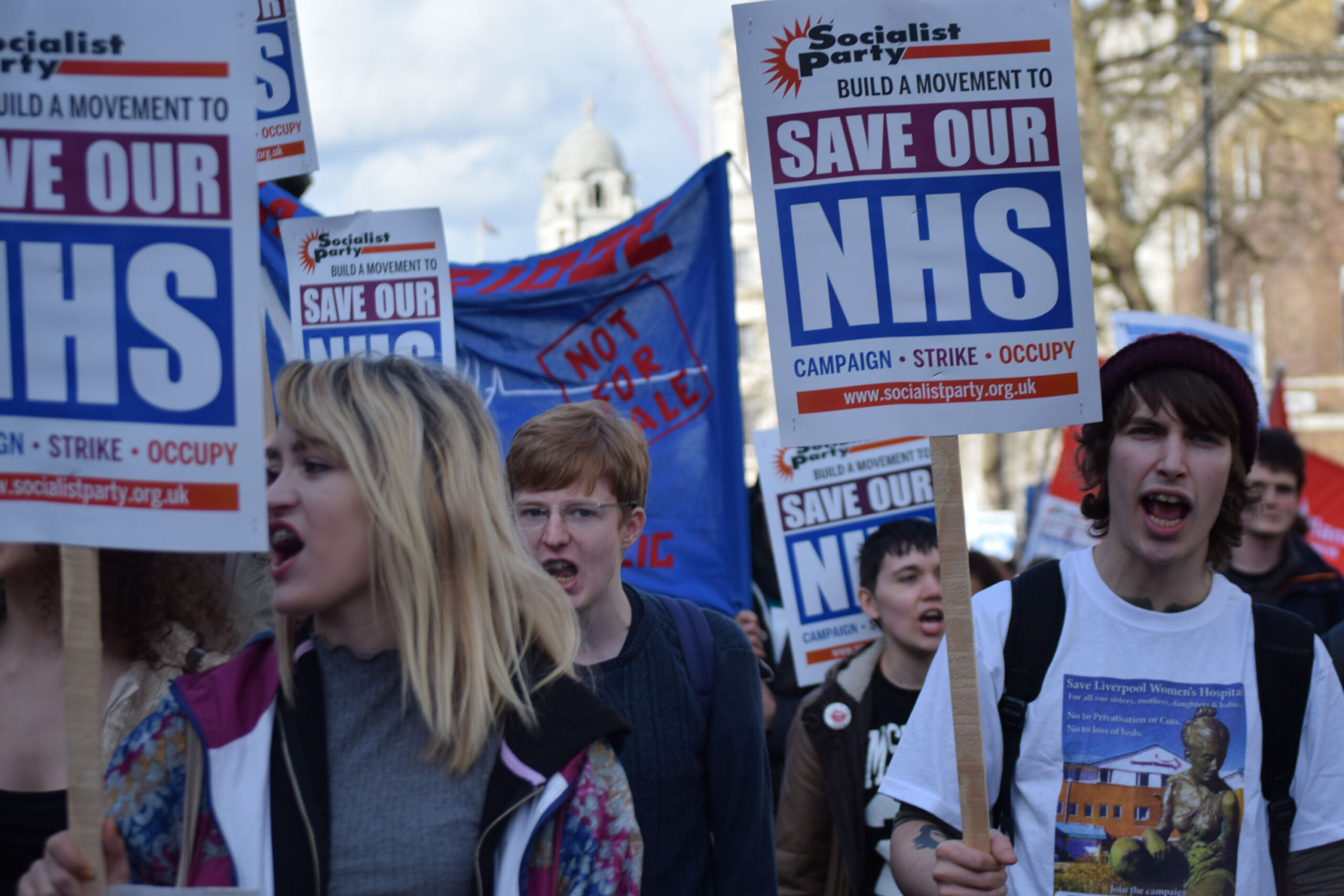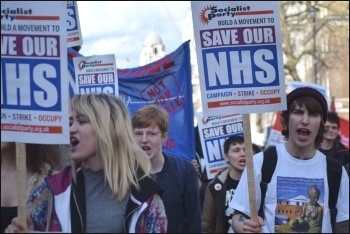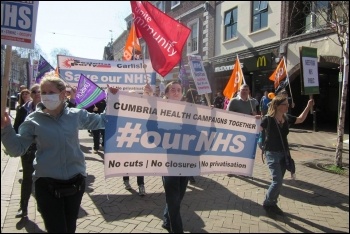STOP PRESS
After this article was written Theresa May announced her plan to call a general election for 8 June. This is a further opportunity for Health Campaigns Together to put the issue of the NHS centre-stage. Imagine the impact, for example, of a trade union-organised national demonstration, led by Jeremy Corbyn, during the election campaign.
Claire Laker-Mansfield, Socialist Party executive committee
The NHS is perhaps the most cherished prize that has ever been won by working class people in British history. The life and death struggle for its future, against the onslaught of cuts and privatisation, has now entered a new phase.
The magnificent demonstration which took place on 4 March has acted to give a huge injection of energy and confidence to NHS workers, community health campaigns and big sections of the wider working class.
Its effects can be seen most prominently among those who work in the health service – where an increased confidence and audacity has been clear in recent weeks.
In a striking example, on 6 April, domestic staff at the Royal London Hospital took part in a walkout against their new employer – the vulture company Serco – which was attempting to remove paid breaks. In less than 24 hours the workers had won a complete victory.
This reflects not only higher morale coming out of the demonstration but the role that can be played by a fighting union branch – in this case the Barts Trust Unite branch. Health workers at hospitals in Barts Trust have taken fighting action over a number of years that has built their confidence to struggle. Socialist Party members working in the trust have played a key role in this.
Also reflecting the enormous anger among NHS workers, particularly after years of appalling ‘pay restraint’, the traditionally more conservative Royal College of Nursing (RCN) has initiated an indicative ballot for strike action. This is supposed to ‘test the mood’ of RCN members for strike action against the government’s outrageous 1% pay offer – which represents a real-terms cut.
The tremendous 4 March demonstration has set the stage for what must now be a determined fight to the finish. It has brought into sharp relief the central questions facing the movement: How can the momentum generated be harnessed? What will be needed for us to defeat the devastating attacks being prepared under the guise of the so-called Sustainability and Transformation Plans (STPs)? How do we escalate the fightback? What programme can offer us a path to victory?
Health Campaigns Together
On 22 April, when Health Campaigns Together (HCT), the body which organised the 4 March demo, meets for its annual general meeting, these questions will undoubtedly be among those most pressing in the minds of the delegates.
The starting point for all the discussions taking place must be that it is possible for us to win. After all, March 2017 demonstrated not only the huge potential strength of working class people, but the severe weaknesses of those we are fighting.
We face a bitterly divided Tory government with a wafer-thin majority. Just three weeks after the demonstration, the chancellor, Phillip Hammond, was forced into a humiliating u-turn over the changes to National Insurance for self-employed people he had planned in his budget. This reflected the government’s extreme vulnerability to public pressure, particularly when it is exerted on its back-bench MPs.
The Socialist Party has consistently pointed out the way in which the NHS – and particularly the STPs – could become a kind of ‘poll tax issue’ for Theresa May. Faced with the pressure of a mass movement, the Tories can buckle. But in order for this to happen our movement needs to adopt a strategy that will be capable of leading it to victory.
HCT is an organisation primarily made up of locally based campaigns to defend NHS services, with the official support of some trade unions. It is very positive that these have begun to be brought together in a national body.
Around the country there are 44 STP ‘footprint’ areas. These each represent what the government has arbitrarily decided is a ‘local health economy’.
The plans vary in each area, but as the main aim of the whole venture is to find £22 billion in ‘savings’ from a system already on its knees, they live up to the nickname they have acquired among NHS staff and campaigners of ‘slash, trash and privatise plans’. In most areas they include mergers, closures, fresh privatisation and cuts to beds and staffing.
Action
Among the ideas being raised at the HCT AGM for ‘where next’ in terms of co-ordinating protest is a week of action. The proposal is that this will start on 1 July and culminate on 5 July – the NHS’s 69th Birthday.
This represents a longer wait for nationally coordinated action than the Socialist Party has advocated, but in the absence of a lead from the national trade union leaders, could still be a positive next step. In order to maximise this potential there should be a determined campaign for simultaneous action in every one of the 44 footprint areas on a single day.
Similarly, while the idea of ‘NHS birthday parties’ has an attraction, given the seriousness of the situation facing our health service, it is important our actions go well beyond celebrations. The focus must instead be on calling and mobilising for protests and lobbies which must be used to help exert the maximum possible pressure on local councils, health trusts, health scrutiny committees and Clinical Commissioning Groups to use all their available powers to reject and sabotage the implementation of the STP plans.
It is possible for many of the STPs to be defeated, or at the very least significantly delayed and frustrated, at a local level. Among those with scrutiny powers are local authorities – many of which are Labour-run.
This is a particularly important point of pressure. We must demand that every local authority uses all the powers it has available to put up barriers to the destruction of health services in their areas.
These powers include the potential to reject an STP plan and to refer it back to the secretary of state, opening the possibility for the plan to be brought before parliament. Even if a very small number of STPs were referred back in this way, it would present a major obstacle for Jeremy Hunt and the Tory government.
Forcing these deeply unpopular plans to be passed through parliament – with all the pressure that could be exerted on local politicians and MPs, including the Tory back benches – could potentially mean it proves impossible for Hunt to force them through. The more plans that get referred back to him, the greater the scope for widespread parliamentary rebellion and the plans becoming simply ‘unworkable’, in a similar way to Thatcher’s hated poll tax.
National coordination is therefore going to be important over the next period. It was positive that Jeremy Corbyn spoke at the 4 March demonstration – offering a message of solidarity to the protest.
But the Labour leadership could potentially play a decisive role in helping to defeat the STPs. If Jeremy were to instruct Labour councillors to fight the implementation of STPs using every weapon at their disposal in a coordinated way, it could rapidly force the government to back down.
Blairites
Unfortunately the defensive posture Corbyn has adopted in the face of the right-wing Blairite opposition he faces within his party, including most Labour councillors, means he has so far not taken any such stand. In fact, on the crucial issue of council cuts – which of course include the devastating attacks on social care which have created a knock-on crisis in the NHS – he has, so-far, capitulated to those right-wing councillors who falsely claim there is ‘nothing we can do’.
This weak stand is contributing to confusion among a large section of working class people as to how Jeremy Corbyn is different to the Labour politicians who have preceded him – including those who carried out many of the policies contributing to the destruction of our health service, such as PFI privatisation.
Nevertheless, even now, if the Labour leadership were to lead a concerted fight in defence of our health service and social care, it could electrify the political situation in Britain and decisively alter Labour’s electoral fortunes.
As well as continuing to build the campaigns at local level, it is essential that the momentum built by this is used to escalate the action that is organised nationally. In particular, the Socialist Party has consistently raised the demand for the Trade Union Congress (TUC) to call a national demonstration in defence of the NHS.
The 4 March protest was largely organised in spite of the right-wing trade union leaderships. While more left-wing union leaders, including Len McCluskey of Unite and Mark Serwotka of PCS, addressed the rally on the national demo, the largest union representing health workers – Unison – gave only grudging support to the protest under pressure.
This was despite the huge numbers of Unison members who took part in, and in many cases helped to organise, the protest. But if HCT were to initiate a call for the TUC to organise a mass demonstration to defend the NHS it would rapidly gain the support of tens of thousands of health workers and union members. Under such pressure, the TUC could be force into calling such an action.
This would not just be a replication of the very successful demo that took place in March. The resources and authority of the TUC mean, given the overwhelming strength of the public mood on the issue, they should be able to put more than a million people on the streets.
Such an action would be of a qualitatively different character to the already successful protest that was organised last month. It would represent a major escalation of the struggle.
The most crucial group of people involved in the fight to defend our health service are NHS workers themselves. If the unions were prepared to organise coordinated strikes of NHS workers it could break the pay freeze and defeat plans for cuts and privatisation of the service.
This, in turn, could help workers gain confidence to carry out other action to defend services. In the past, hospital occupations by NHS staff have prevented closures. As the STPs begin to be implemented, these could rapidly be placed on the agenda once again.
Ultimately, a mass movement built in this way would need to go on the offensive. We need to fight not only for an end to the latest attacks on our NHS but for a comprehensive programme to restore and improve it.
Public ownership
This must include bringing back into public hands all of the privatised parts of the service. It should include scrapping the PFI contracts which are ravaging the service and refusing to pay back money to the vultures making mega-profits by bleeding the NHS dry.
It would include fighting for huge investment in health. It would mean nationalising the pharmaceutical industry to end its scandalous profiteering from ill health. And it would mean fighting for a fully funded, publicly owned social care service to provide an end to the indignities inflicted on elderly and vulnerable people, as well the unnecessary pressures on hospital care.
The 4 March demonstration has opened up the opportunity to build such a movement. But now we must fight tooth and nail to ensure that it is taken full advantage of.
The Socialist Party says:
- No cuts, closures or jobs losses
- Stop the Tory ‘STP’ cuts plan. Councils should refuse to cooperate with STPs
- Big business out! Scrap all privatisation schemes. Renationalise our NHS
- Reverse council cuts to social care
- Decent pay for NHS staff. No attacks on NHS workers’ pay and conditions
- Mass protest action to defend the NHS including strikes and occupations – a day of action in all STP areas as soon as possible
- Labour and trade unions to organise a massive national demo
- For a comprehensive, high quality NHS, under democratic control with care free at the point of use – a socialist NHS










